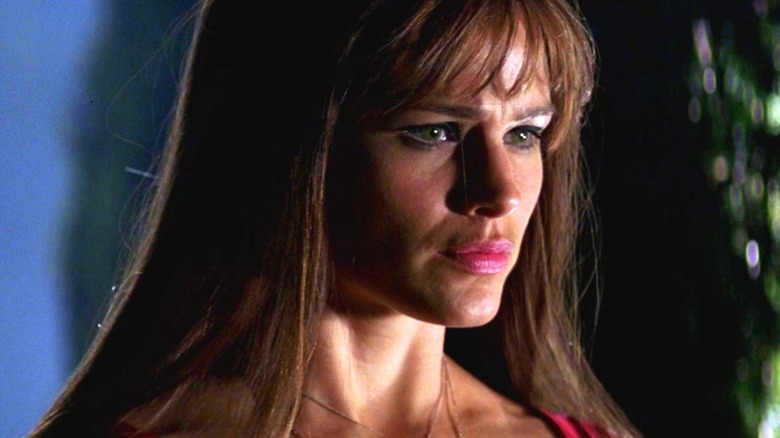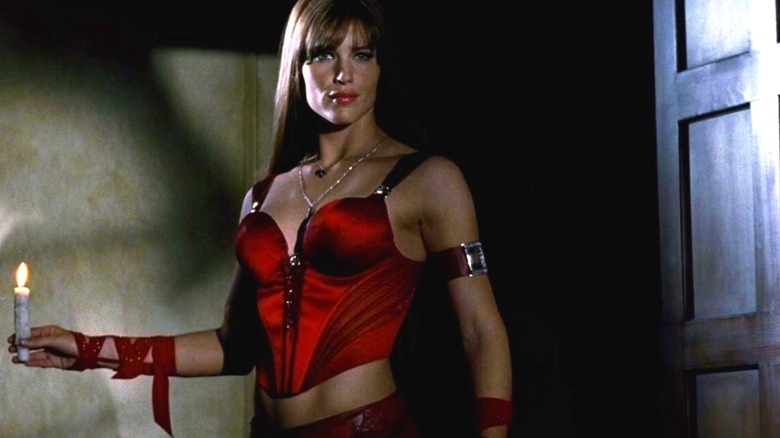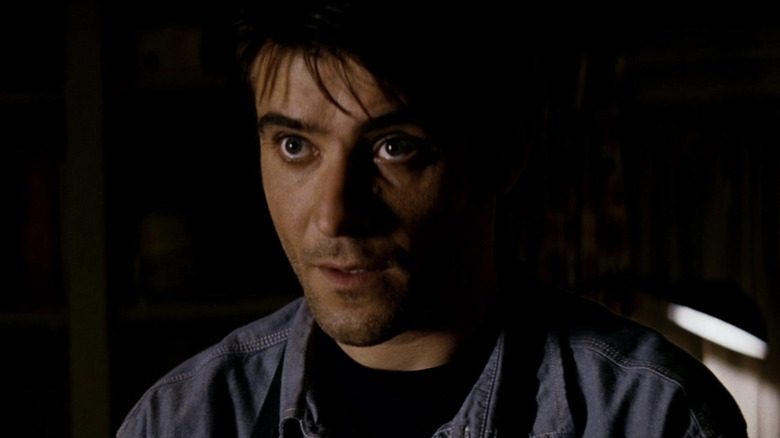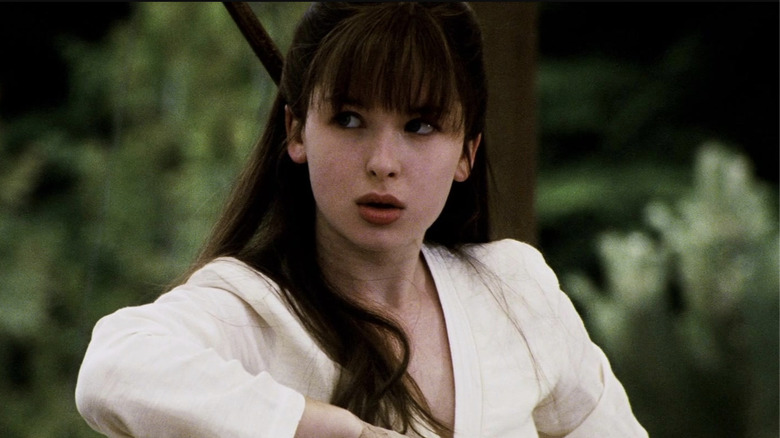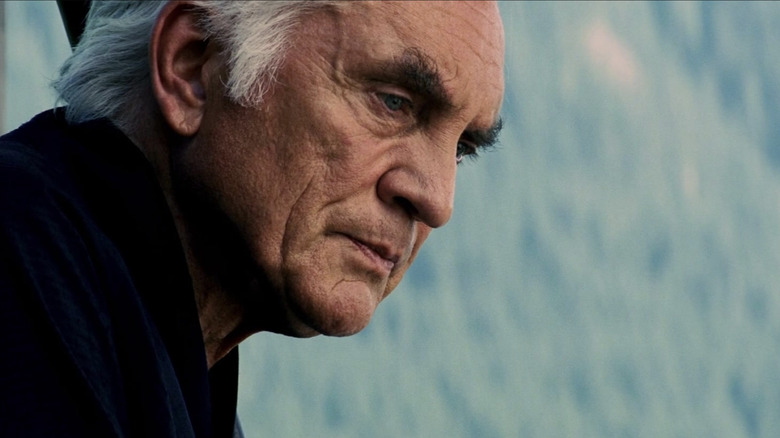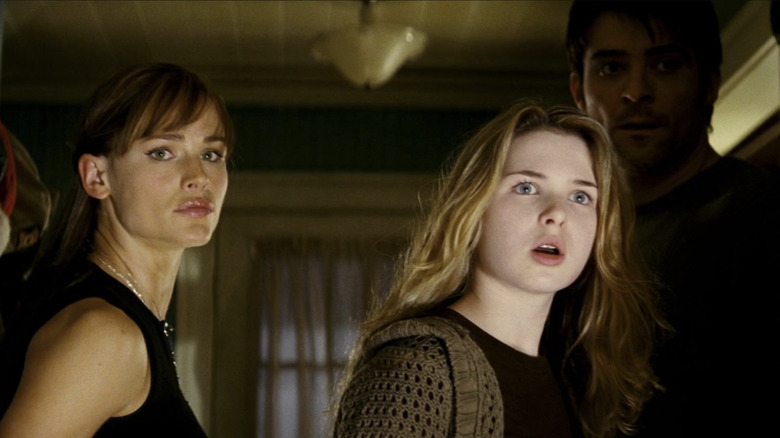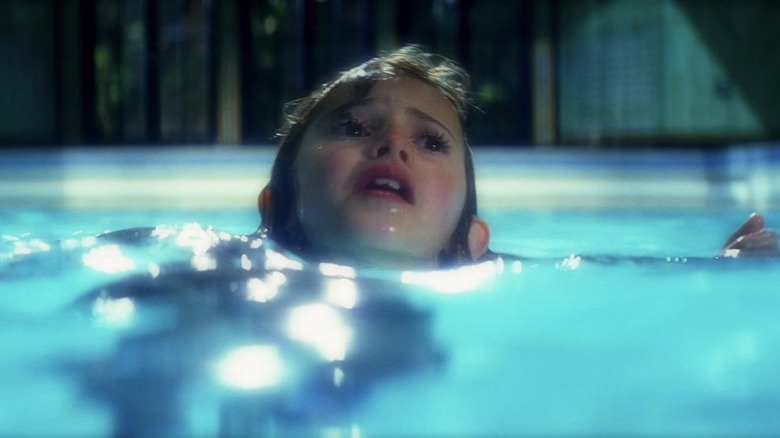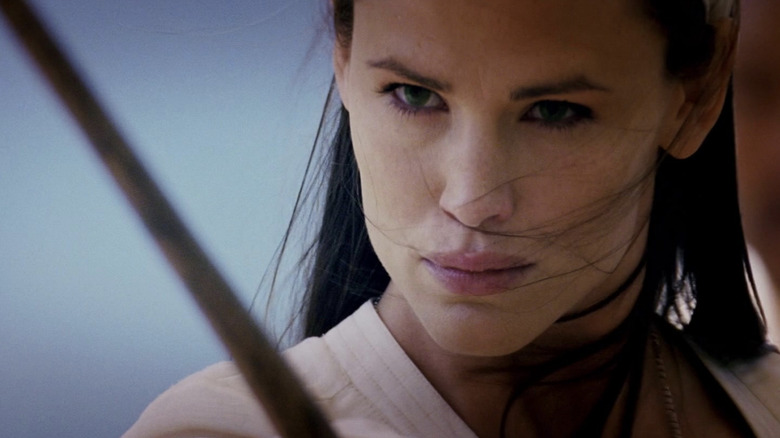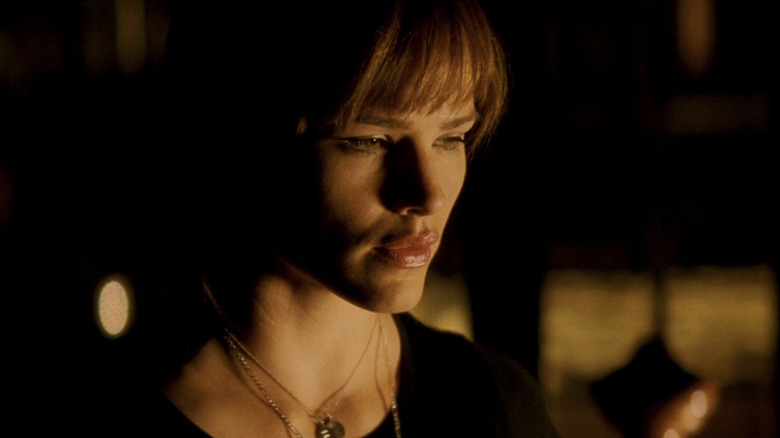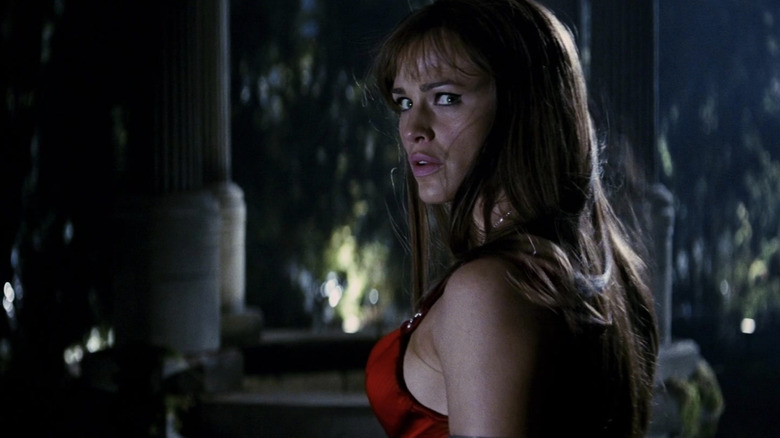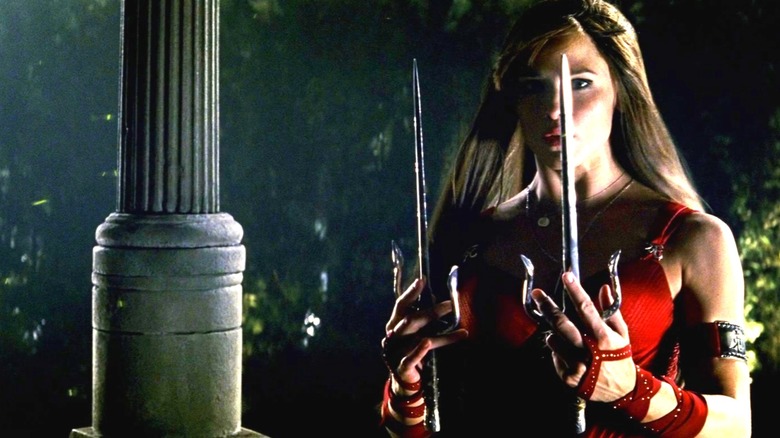The Ending Of Elektra Explained
The 2003 film "Daredevil," starring Ben Affleck as the titular hero, Matt Murdock, was a commercial success despite some tepid reviews. Among the handful of kind words offered by fans and critics was praise for Jennifer Garner, a standout as Murdock's love interest, the vengeful Elektra. Roger Ebert, hilariously, expressed concerns over the love story's more intimate scenes: "She and Daredevil are powerfully attracted to each other, and even share some PG-13 sex, which is a relief because when superheroes have sex at the R level, I am always afraid someone will get hurt." Definitely a new perspective on the superhero genre.
Garner would reprise her role in the 2005 spin-off film "Elektra," in which (spoilers for the ending of "Daredevil") Elektra returns from the dead, builds herself a burgeoning business as an assassin (complete with a booking agent played by Colin Cunningham), and protects a young martial arts prodigy and her father. The solo outing was produced on a small budget of only $43 million and on a quick schedule due to Garner's schedule with "Alias," for which she was on hiatus.
"Jennifer showed up within days of the first day of shooting, and I went back to work with her just days after wrapping on 'Alias.' The prep was very, very compressed," director Rob Bowman told IGN. "But that was just the nature of the beast. We had to start shooting when Jennifer finished 'Alias' and we had to let her go at the end of her hiatus, and that drove everything. Filming all this, we did the best we could with the time we had." Unfortunately, the best they could do received negative reviews and was a financial failure. Still, "Elektra" deserves a second look for some intense action and a surprisingly redemptive ending.
Elektra ends with peace
Elektra has quite a journey throughout the film. Having died at the end of "Daredevil" (apologies for spoiling a movie that came out in 2003), she's brought back to life by a martial arts mystic known as Stick, played by superhero alum Terence Stamp (General Zod in "Superman II"). After her resurrection, Elektra goes through a rigorous training program and eventually becomes an assassin (logical step). This delightful gig leads her to Mark (Goran Visnjic), Abby (Kirsten Zien), and a difficult choice: She can either shoot them (which is her job) or have a short romance with Mark and become a mother figure to Abby. Elektra chooses the latter option.
The trio does everything they can to escape the Hand, a martial arts cabal intent on kidnapping Abby. This brings Elektra into a fight with Kirigi (Will Yun Lee), the man who murdered her mother. When Abby is killed during the battle, Elektra revives her using Kimagure, eventually telling Abby to try and live a normal life before heading off to her next adventure.
It's clear that Elektra has finally let go of her anger, achieved some measure of peace after the death of her parents, and is ready to move forward in her life. What's less clear is why she chooses to do it away from Mark and Abby after having built a relationship with them both. Why not stay with the pair, enjoying some hard-won domestic bliss? While it's never stated that Elektra is on her way to rid the world of the rest of the Hand members, it seems evident that she leaves to take care of some serious business, and tracking down the last few remaining members of a crime syndicate is a worthy mission. Either way, some of Elektra's last words to Abby are a promise that they'll "find each other," giving audiences hope for the trio.
Elektra's new love interest
The character of Mark Miller is definitely no Daredevil (Elektra's previous love interest). In fact, the charming father of young Abby seems completely at odds with the "Guardian Devil" spirit that personifies Matt Murdock. While Elektra and Mark share a sweet romantic relationship, he's still very much focused on keeping his daughter safe. During the film, audiences discover that Mark's wife was killed a few years prior to the start of the story, another casualty of the Hand's search for Abby, which is why everything in his life is about protecting her.
In the end, though, after Elektra has resurrected Abby and the three of them recuperate, Mark and Elektra share a bittersweet kiss that seems to indicate their affair has ended. Obviously, Mark will stay with Abby and attempt to give the poor girl something of a normal life. In their final moments together, Elektra walks out the door, turning back to share a smile with Mark before she leaves, leaving romantic audiences with a hint of a happily ever after for the pair, even if it's somewhere in the distant future.
A rebellious treasure
It seems like very early 2000s action movie needs a rebellious teenager to soften the edgy hero, which is a perfect descriptor of Abby Miller's character. Kirsten Zien plays the role of Abby Miller (credited as Kirsten Prout at the time). Audiences meet Abby as she's trying to rob Elektra (bad idea). However, she immediately realizes that Elektra is not your average adult when Elektra nearly impales her with a knife.
And even though Abby doesn't die at the beginning of the film (despite Elektra's best efforts), she is eventually killed by Typhoid (Natassia Malthe) at the end. Don't worry, though — the martial arts prodigy known as "the treasure" is saved and brought back to life by Elektra, who can perform the Kamigure now that she's released her rage.
Since the Hand appears to be disbanded, Abby and her father are free to pursue a normal life. "Go to the beach, get a tan," Elektra tells her. The two have clearly developed a bond, and Elektra promises her they'll find each other again. Abby hugs her protector goodbye, and the question of whether she will continue to train in martial arts is left unanswered. it's safe to assume, though, that her time with Elektra has left Abby sharper and more prepared for any challenges life has in store for her.
A morally ambiguous mentor
Elektra's martial arts mentor is Stick (Terence Stamp), who isn't above exiling his protégé and then setting her up to assassinate a child. Elektra discovers that Stick set up the hit on Mark and Abby as a test of whether Elektra has moved past her anger management issues and will choose not to kill a child (it seems like there are better ways to check that). The hit is also intended to lead Elektra to Abby, the next martial arts "treasure."
The end of "Elektra" sees Stick waiting for her outside her childhood home, finally offering some positive words for Elektra, telling her that she "didn't turn out too bad." We assume that he'll keep an eye on Abby as she ages, just to ensure she doesn't feel the urge to become an assassin like his last student.
As part of his inspiration for the role, Stamp was influenced by a Russian philosopher from the 1920s. Though he didn't name the particular thinker he was referencing, Stamp told Movie Web, "I thought a lot about him. He was one of those people who was deadly serious about increasing the consciousness of people. And he did have a band of disciples that he dragged across the world with him."
Motherhood is a central theme
In the movie's climax, Abby Miller is killed by the Hand in much the same way as Elektra's mother, who was a casualty of the Hand's search for Elektra. In the Marvel Universe, being a martial arts wunderkind doesn't necessarily make you any safer; it often just puts your loved ones in danger. However, this shared sense of loss connects Elektra and Abby, pulling them closer as they both search for peace and safety.
While Elektra can protect Abby in a way that neither of their mothers were able to do for them, it's her relationship with Abby that helps Elektra to move on from her tragic past. By caring for a young girl, guiding her through the trials of being the "treasure," and encouraging her to live a normal life, Elektra softens, letting go of her guilt and rage.
At several points throughout the film, Abby rushes to defend Elektra, jumping into fights well beyond her skill level. It's easy to see how anxious Abby is over her concern for Elektra, clearly unwilling to allow another mother figure to die for her sake. It's interesting, though, that despite obviously caring for Abby, Elektra chooses to leave at the end of the film, knowing she has more work to do. This is at odds with many other motherhood narratives that push female characters towards the idea of sacrifice at the cost of the self — Elektra is allowed the space she needs to progress and fully heal from the trauma of her mother's death ... and, let's face it, her own.
Dealing with trauma
Of course, "Elektra" isn't just the name of a comic book character; it's also an ancient Greek tragedy about revenge and grief. Obviously, creator Frank Miller (who introduced the character during his run on "Daredevil" in the '80s) wasn't afraid to look for classical inspiration in his work. This idea of trauma isn't thoroughly examined in the 2005 film, which is a shame since there are moments when the movie does touch on some compelling facets of Elektra's life and personality. Perhaps that rushed production held the story back from being everything it could have been in this particular regard.
Audiences see a flashback of Elektra's childhood, showing her as a young girl struggling to tread water in the family's pool. Her father forces her to continue, though what she'll learn from drowning is anyone's guess. "She's only a girl!" her mother cries, which her father ignores, forcing his young daughter to continue in her fight to stay afloat. As an adult, Elektra carries around her mother's necklace, clearly devastated by her mother's death, less so about her father's (fair enough). Beyond this brief flashback, however, there's little mention of her father, a lost opportunity to flesh out her character.
Later, Abby watches Elektra walking and realizes that she counts her steps, sometimes a symptom of OCD. Abby mentions it to her, though Elektra denies having any issues with OCD behaviors. Again, another moment that could have offered us greater insight into the struggles Elektra faces, passed by in favor of a quick action scene.
Searching for peace
Letting go of the past is a difficult task for a superhero whose memories involuntarily skip through time. Imagine trying to let go of childhood trauma, only to be catapulted back into your worst moments. After Stick brings her back to life, Elektra spends some time in his training camp, trying to work out her frustrations from having died by slamming her fellow students into the ground — not the healthiest way of dealing with emotional issues.
Stick excommunicates her from his little band, pushing her into the killer-for-hire scene, a career choice that fuels her rage and emotional detachment. However, the only way for Elektra to move forward and control Kamigure, the power of time travel and resurrection, is through letting go of her rage. Elektra is finally able to access the total reach of Kamigure by the end of the film, her grief over Abby's death enabling her to release the vengeful emotions that have ruled her adult life.
Could there be another Elektra film?
The Marvel movie landscape in the early 2000s was very different than it is today. After the tepid critical response to "Daredevil," Garner hadn't wanted to continue playing Elektra. According to Michael Vartan (Garner's "Alias" co-star and friend), Garner only reprised her role of Elektra because she was contractually obligated (via SFGate).
In later years, Garner has spoken about the experience of working within the Marvel Universe at the time, praising the more recent work of current studio head Kevin Feige and the legacy of the Marvel Cinematic Universe. "It's such a shame, honestly, because once Kevin [Feige] took over everything there was elevated: the writing, the direction, the comedy inside of the stories they were telling. And I did not have that experience," she told The Hollywood Reporter.
Zack Snyder once expressed a desire to direct an "Elektra" reboot in a conversation with ComicBook Debate. With the character now under the Marvel Studios umbrella (and a Daredevil Disney+ show coming) another Elektra movie could be on the horizon. If Garner was offered a chance to work again in the modern Marvel Universe, would she take it? Let's hope so, because if anyone deserves to show off her mad skills with a blade, it's Jennifer Garner.
Elektra's theatrical version was never properly finished
"Elektra" director Rob Bowman never felt like the theatrical version of the film represented the best that he and his crew could do, primarily due to the time and budget constraints under which the cast and crew were operating. "The final theatrical version of 'Elektra' is not a total version," Bowman explained to IGN. "I got it done. I'd come back to the studio and I'd watch a reel. I'd give them notes. I'd get in my car and I'd drive to Burbank for the color and give them notes. I'd go to the lab for the print and give them notes. It was just due to the nature of the short post, and we wanted to hit a certain release date." Marvel Studios chief Avi Arad admitted at the time that Elektra had been rushed. "We will never do that again," he told Variety.
Bowman eventually created a director's cut of the movie for the DVD release that incorporates deleted scenes and fixes some of the issues with the editing. Some deleted scenes, though, never made it back into the film. Ben Affleck had filmed a cameo reprising his role as Daredevil (at Garner's request, per The Sydney Morning Herald), but even he ultimately landed on the cutting room floor. During filming, Bowman was clear that Daredevil should only return as a memory of Elektra's, telling IGN, "This was the only time and the only place I could put him, was when she's sort of in a recovery/dream-state. And I couldn't let the audience start to believe or suppose that he may return at the end of the movie. I wanted the audience to believe, it's either Elektra's going to solve this or we're doomed."
Garner learned martial arts for the film
While Garner may have been disappointed in how the movie turned out, she loved the role's physicality. "I've been training for the past couple of months. I trained after the junket last night and got up this morning and will go again tonight, and I'm loving it. I love that aspect of it," she said at the time (via Comic Book Movie).
Garner has always spoken of her love for training and doing stuntwork, even telling Drew Barrymore, "The whole reason I got so excited about investing myself in stunts, and doing them all, and learning to fight, and being on wires, was because of 'Charlie's Angels.'"
Garner took that love of stuntwork and action scenes to the sets of "Daredevil" and "Elektra" when she trained for almost four months before the filming of "Daredevil," practicing her sai skills. Though this didn't always prevent accidents, Garner revealed to Film Is Now that the camera crew had to be brave while filming, since her swords slipped out of her hands more than once, almost "impaling" a few of them.
